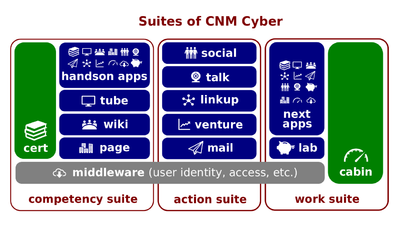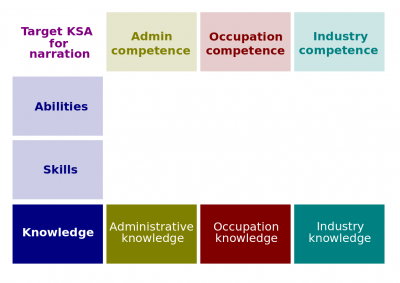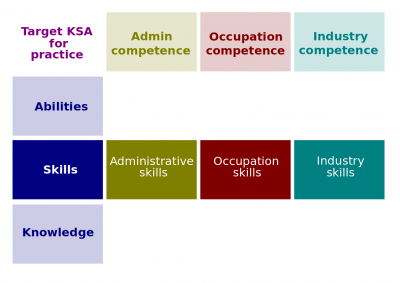Difference between revisions of "Educational Methods"
(→Outline) |
|||
| (18 intermediate revisions by 2 users not shown) | |||
| Line 1: | Line 1: | ||
| − | [[File:Cnm-digital.png|400px|thumb|right|[[ | + | [[File:Cnm-digital.png|400px|thumb|right|[[CNMCyber suite]]s]]The [[Educational Methods]] (hereinafter, the ''Lesson'') is the [[lesson]] of [[CNMCyber]] that introduces its participants to various methods used in provision of [[education]]. The ''Lesson'' belongs to the '''[[Introduction to Education]]''' session of [[EmployableU Concepts]]. |
| − | The ''Lesson'' is made up of | + | The ''Lesson'' is made up of five [[lectio]]s. At [[CNMCyber]], the word, [[lectio]], is used for a lesson part. |
| Line 14: | Line 14: | ||
!#!!Referred topics | !#!!Referred topics | ||
|- | |- | ||
| − | ![[Methods | + | ![[Methods of Study]] |
| − | |1|| | + | |1||[[Educational method]], [[learning activity]] |
|- | |- | ||
| − | ![[ | + | ![[Content Deliveries]] |
| − | |2|| | + | |2||[[Learning content delivery]], [[demonstrating]], [[job shadowing]], [[narrated instruction]], [[lecturing]], [[storytelling]] |
|- | |- | ||
![[Practical Instructions]] | ![[Practical Instructions]] | ||
| − | |3|| | + | |3||[[Practical instruction]], [[hands-on training]], [[guided experiment]] |
|- | |- | ||
| − | ![[Cognitive | + | ![[Cognitive Studies]] |
| − | |4|| | + | |4||[[Cognitive research]], [[formative assessment]], [[substantive discussion]], [[Socratic method]], [[elicitation technique]] |
|- | |- | ||
| − | ![[Experiential | + | ![[Experiential Studies]] |
| − | |5|| | + | |5||[[Experiential learning]] ([[experiential learning|activity-based learning]], [[Experiential learning|learning by doing]], [[Experiential learning|learning through play]]), [[learning by making]] ([[project-based learning]], [[problem-based learning]]), [[exploratory research]], [[learning through failure]], [[case-based learning]] |
|} | |} | ||
===Successor=== | ===Successor=== | ||
| − | :The successor lesson is [[Learning | + | :The successor lesson is [[Learning Management]]. |
| − | == | + | ==2019 Educational Methods presentation== |
| − | + | The video of the presentation is published on https://youtu.be/gjTMEDHpj3o (8:23). Here is its full text. | |
| − | |||
| − | |||
| − | |||
| − | |||
| − | |||
| − | |||
| − | |||
| − | |||
| − | |||
| − | |||
| − | |||
| − | |||
| − | |||
| − | |||
| − | |||
| − | |||
| − | |||
| − | |||
| − | |||
| − | |||
| − | |||
| − | |||
| − | |||
| − | |||
| − | |||
| − | |||
| − | |||
| − | |||
| − | |||
| − | |||
| − | |||
| − | |||
| − | |||
| − | |||
| − | |||
| − | |||
| − | |||
| − | |||
| − | |||
| − | |||
| − | |||
| − | The video of the presentation is published | ||
===Overview=== | ===Overview=== | ||
| Line 107: | Line 65: | ||
===Summary=== | ===Summary=== | ||
| − | :This concludes the ''Educational Methods'' presentation. We have defined [[educational method]]s and taken a look at major of them such as [[narrated instruction]], [[practical instruction]], [[cognitive research]], and [[experiential learning]]. One [[heuristic]] called [[learning through failure]] was given a special consideration. If you haven't done yet so, you are now welcome to move to | + | :This concludes the ''Educational Methods'' presentation. We have defined [[educational method]]s and taken a look at major of them such as [[narrated instruction]], [[practical instruction]], [[cognitive research]], and [[experiential learning]]. One [[heuristic]] called [[learning through failure]] was given a special consideration. If you haven't done yet so, you are now welcome to move to ''Learning Environments''. |
| − | |||
| − | |||
| − | |||
| − | |||
| − | |||
| − | |||
| − | |||
| − | |||
| − | |||
| − | |||
| − | |||
| − | |||
| − | |||
| − | |||
| − | |||
| − | |||
| − | |||
| − | |||
| − | |||
| − | |||
| − | |||
| − | |||
| − | |||
| − | |||
| − | |||
| − | |||
| − | |||
| − | |||
[[Category: Orientation Curriculum]][[Category:Presentations]] | [[Category: Orientation Curriculum]][[Category:Presentations]] | ||
Latest revision as of 19:30, 29 October 2023
The Educational Methods (hereinafter, the Lesson) is the lesson of CNMCyber that introduces its participants to various methods used in provision of education. The Lesson belongs to the Introduction to Education session of EmployableU Concepts.
The Lesson is made up of five lectios. At CNMCyber, the word, lectio, is used for a lesson part.
Contents
Summaries
Predecessor
- The predecessor lesson is Education Essentials.
Outline
Successor
- The successor lesson is Learning Management.
2019 Educational Methods presentation
The video of the presentation is published on https://youtu.be/gjTMEDHpj3o (8:23). Here is its full text.
Overview
- Welcome to Educational Methods. In this brief presentation, we are going to take a look at those methods that educators use. Let's roll.
What an educational method is
- Educational method is an established procedure for one`s education. This procedure can be grouped in several categories; narrated instruction, practical instruction, cognitive research, experiential learning or some combination of those. Before jumping into these groups let`s site social learning theory which suggests that we can learn through both, observation and direct experience. Sometimes you just go, look, observe and you can learn from that. You don`t need a special setting or arrangement.
Narrated instruction
- Anyway, back to narrated instruction. This is any educational method that is based on narration such as lecturing, storytelling, demonstrating.
- Lecturing is based on lectures, storytelling is like telling stories and demonstrating includes one or more demonstrations. If you take a look at knowledge, skills and abilities which of these type of methods target, mostly target knowledge. It doesn`t give like a feeling or skills, or abilities, it`s not like beyond ability basically it`s knowledge. It gives administrative knowledge, occupation knowledge, industry knowledge if we talk about employment and KSA`s.
Practical instruction
- Let's go to practical instruction. Practical instruction is any educational method that is based on prescribed, practical exercises relate to the subject of learning. It can include hands on training or guiding experiment. You have a very strict instructions or guides or steps i.e. do this, click here, click there, see what happens and you learn from that hands on experience.
- Let's take a look at targets and knowledge, skills and abilities. For this type of educational methods. It targets primarily skills. Of course it can be combined with knowledge or maybe abilities further but mostly target skills. It`s supposed to give you some feeling, how to feel like, how you can be a coder, you have coded a line so you have this feeling of emotion. So it gives skills but at the same time skills without knowledge may not be useful. Usually practical instructions are combined with something else.
Cognitive research
- Moving to cognitive research, this is educational method that is based on experience that requires cognitive analysis and or evaluation of the subject of learning. They key word is cognitive. It`s only related to knowledge again. And here, we have cognitive assessment. Let’s say if you want to take exam based on this lecture you will be given a formative assessment and you will be given a feedback, you will be given your result based on your answers. In this case you can learn through your assessment substantive discussion debate on some critical issues and is not prescribed. Especially it`s useful when the debriefing follows. This method was developed in the Harvard School of Business and basically it`s goal is to put learners into real world situations given some knowledge and force them to make a decision. In this case, teachers cannot be a part of a decision making. Their role is to be observers and later facilitate debriefing for lessons.
- One more method is Socratic method, which was developed according to this letter by Socratis in ancient Greece and Socrates instead of giving answers on questions of his students, try to ask the questions and prompt them to arrive on their own conclusions. So to use critical thinking while answering challenging questions related to the subject of learning.
- Going back, cognitive research deals mostly with knowledge. It gives you like a better understanding or better feeling that it doesn't necessarily give skills and abilities, in some cases it is not direct, it cannot be a role that is why target KSA matrix but once again it`s not about experience.
Experiential learning
- Experiential learning, in other words learning by doing, or learning through play is any education method that is based on both direct experience in cognitive reflection on that experience. Cognitive reflection is the key because technically you can have some experience but that not necessarily lead you to learning. Some people live in the United States of America but they practice some English but they never learn English because they don`t reflect on that English and they can still be in their own language. So experiential learning can be project based learning, when you are given some project and work in a project sometimes in the team and project leads to some results, exploratory research where no one can know where their answer will be and I like learning through failure. In many cases it is how we learn faster than in any other methods.
- Once again getting back to experiential learning definition, this methodology may also be defined as learning through reflection on doing.
Summary
- This concludes the Educational Methods presentation. We have defined educational methods and taken a look at major of them such as narrated instruction, practical instruction, cognitive research, and experiential learning. One heuristic called learning through failure was given a special consideration. If you haven't done yet so, you are now welcome to move to Learning Environments.


